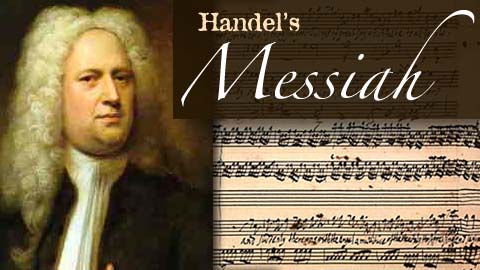The first performance of Handel’s Messiah
Georg Frideric Handel (1685-1759) was a German composer who settled in England in 1712. Though he began his career as a prolific producer of Italianate opera, he is best known for his oratorio, Messiah, about the birth, death and resurrection of Jesus. Only a part of it relates to the Nativity and it was originally meant as an Easter piece, but it is now most frequently performed during the Christmas season.
The music was written by Handel, working without a commission, in a mere twenty-four days in 1741. The composer claimed that he was literally inspired: “I did think I did see all Heaven before me, and the great God Himself.” His librettist Charles Jennens was less impressed, saying that Handel’s treatment of his text was “not near so good as he might and ought to have done…There are some passages far unworthy of Handel, but much more unworthy of the Messiah.” Jennens assembled his libretto from scripture and was intent on refuting the contemporary Deism with its notions of a watch-maker God who makes no interventions in human life, that was so popular among the intelligentsia of his time.
The first performance of Messiah was in Dublin where it was meant to raise money for the benefit of “the Prisoners in several Gaols, and for the support of Mercer’s Hospital in Stephen Street, and of the Charitable Infirmary on the Inn’s Quay.” The oratorio was extremely well-received by the audience. The contralto solo by the scandalous Susanna Cibber (she had fled England with her adulterous lover) prompted the chancellor of the cathedral to rise and shout “Woman, for this all thy sins be forgiven thee.” It was less popular at first in London but has come to be recognized around the world as the quintessential classical Christmas composition. Following an example set by King George II the audience customarily rises during the “Hallelujah” chorus. It is also common for audiences to bring their own scores and sing along with the choir.
Handel’s original version was written for a modest-sized orchestra and chorus but in the nineteenth and twentieth centuries it became fashionable to stage the piece with massive numbers of instrumentalists and singers. More recently, attempts have been made to return to the smaller ensembles which Handel intended.
